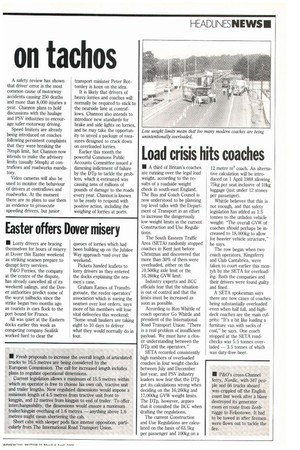Load crisis hits coaches
Page 7

If you've noticed an error in this article please click here to report it so we can fix it.
• A third of Britain's coaches are running over the legal load weight, according to the results of a roadside weight check in south-east England. The Bus and Coach Council is now understood to be planning top level talks with the Department of Transport in an effort to increase the dangerously low weight limits in the current Construction and Use Regulations.
The South Eastern Traffic Area (SETA) randomly stopped coaches in Kent just before Christmas and discovered that more than 30% of them were overloaded, either on the I0,500kg axle limit or the 16,260kg GVW limit Industry experts and BCC officials fear that the situation is out of control and that the limits must be increased as soon as possible.
According to Ron Whittle of coach operator Go Whittle and president of the International Road Transport Union: "There is a real problem of insufficient payload. We must have a closer understanding between the DTp and the operators."
SETA recorded consistently high numbers of overloaded coaches in four weight-checks between July and December last year, and PSV industry leaders now fear that the DTp got its calculations wrong when deciding on the 16,260kg and 17,000kg GVW weight limits. The DTp, however, argues that it consulted the BCC when drafting the regulations.
The current Construction and Use Regulations are calculated on the basis of 63.5kg per passenger and 100kg on a
12 metre n(13 coach. An alternative calculation will be introduced on 1 April 1988 allowing 75kg per seat inclusive of 10kg luggage (just under 12 stones per passenger).
Whittle believes that this is not enough, and that safety legislation has added as 1.5 tonnes to the unladen vehicle weight: "The overall GVW of coaches should perhaps be increased to 18,000kg to allow for heavier vehicle structure," he says.
The row began when two coach operators, Kingsferry and Club Cantabrica, were taken to court earlier this montyh by the SETA for overloading. Both the companies and their drivers were found guilty and fined.
A SETA spokesman says there are now cases of coaches being substantially overloaded even when half full, and highdeck coaches are the main culprits: "It's a bit like loading a furniture van with sacks of coal," he says. One coach stopped at the SETA roadchecks was 5.5 tonnes overladed — 3.5 tonnes of which was duty-free beer.
















































































































































